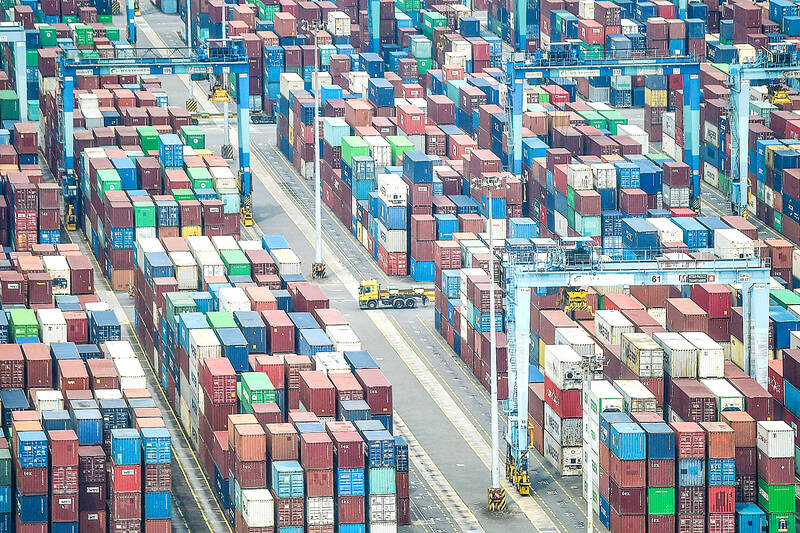Malaysia has urged Chinese companies to refrain from using it as a base to “rebadge” products to avoid US tariffs, Malaysian Deputy Minister of International Trade and Industry Liew Chin Tong (劉鎮東) said yesterday, amid increasing export restrictions and concerns of a US-China trade war.
Washington is expected to further curb exports to Chinese semiconductor toolmakers and sales of certain chipmaking equipment, including products manufactured in Malaysia, Singapore and Taiwan, sources have said.
Malaysia is a major player in the semiconductor industry, accounting for 13 percent of global testing and packaging, and is seen as well-placed to grab further business in the sector as Chinese chip firms diversify overseas for assembling needs.

Photo: AFP
“Over the past year or so ... I have been advising many businesses from China not to invest in Malaysia if they were merely thinking of rebadging their products via Malaysia to avoid US tariffs,” Liew told a forum.
He did not specify the types of businesses.
Liew said regardless of whether the US had a Democratic or Republican administration, the world’s largest economy would impose tariffs, as seen in the solar panel sector.
Washington imposed tariffs on solar exports from Vietnam, Thailand, Malaysia and Cambodia — home to factories owned by Chinese firms — last year and expanded them in October following complaints from manufacturers in the US.
US president-elect Donald Trump has threatened to slap an additional 10 percent tariff on all Chinese imports when he takes office on Jan. 20.

Application-specific integrated circuit designer Faraday Technology Corp (智原) yesterday said that although revenue this quarter would decline 30 percent from last quarter, it retained its full-year forecast of revenue growth of 100 percent. The company attributed the quarterly drop to a slowdown in customers’ production of chips using Faraday’s advanced packaging technology. The company is still confident about its revenue growth this year, given its strong “design-win” — or the projects it won to help customers design their chips, Faraday president Steve Wang (王國雍) told an online earnings conference. “The design-win this year is better than we expected. We believe we will win

Intel Corp chief executive officer Lip-Bu Tan (陳立武) is expected to meet with Taiwanese suppliers next month in conjunction with the opening of the Computex Taipei trade show, supply chain sources said on Monday. The visit, the first for Tan to Taiwan since assuming his new post last month, would be aimed at enhancing Intel’s ties with suppliers in Taiwan as he attempts to help turn around the struggling US chipmaker, the sources said. Tan is to hold a banquet to celebrate Intel’s 40-year presence in Taiwan before Computex opens on May 20 and invite dozens of Taiwanese suppliers to exchange views

Chizuko Kimura has become the first female sushi chef in the world to win a Michelin star, fulfilling a promise she made to her dying husband to continue his legacy. The 54-year-old Japanese chef regained the Michelin star her late husband, Shunei Kimura, won three years ago for their Sushi Shunei restaurant in Paris. For Shunei Kimura, the star was a dream come true. However, the joy was short-lived. He died from cancer just three months later in June 2022. He was 65. The following year, the restaurant in the heart of Montmartre lost its star rating. Chizuko Kimura insisted that the new star is still down

While China’s leaders use their economic and political might to fight US President Donald Trump’s trade war “to the end,” its army of social media soldiers are embarking on a more humorous campaign online. Trump’s tariff blitz has seen Washington and Beijing impose eye-watering duties on imports from the other, fanning a standoff between the economic superpowers that has sparked global recession fears and sent markets into a tailspin. Trump says his policy is a response to years of being “ripped off” by other countries and aims to bring manufacturing to the US, forcing companies to employ US workers. However, China’s online warriors